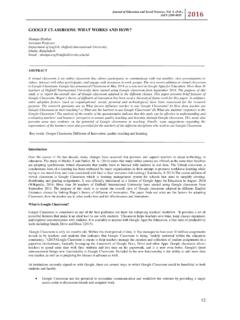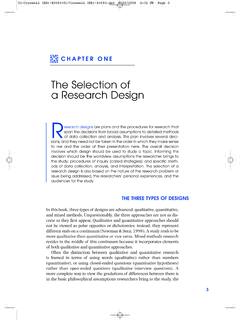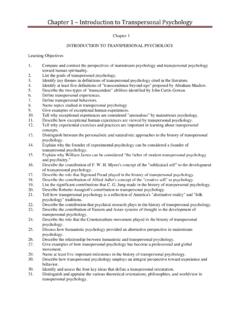Transcription of CIVILIZATION: HISTORY, DESCRIPTION, COMMON …
1 2016. Journal of Education and Social Sciences, Vol. 5, (October). ISSN 2289-1552. civilization : history , DESCRIPTION, COMMON characteristics AND. importance . Kabuye Uthman Sulaiman Department of Fundamental and Inter-Disciplinary Studies Kulliyyah of Islamic Revealed Knowledge and Human Sciences International Islamic University Malaysia E-Mail: Tel: +60123678174. ABSTRACT. civilization is a characteristic of people; it is one of the things that set human beings apart from other While it is true that all living things form societies, it is only human beings who have a civilization . A civilization provides man with numerous basic needs and wants. One of the aims of this paper is to expound these needs and wants. They are classified as follows: (a). physical and material (economic) needs, such as shelter, food, clothing and tools, (b) spiritual and psychic (religious) needs, such as a worldview, (c) intellectual needs, (d) gregarious (social) needs, such as companionship and interrelationships between people, (e) military,ii (f) technological needs, and (g) cultural needs.
2 Another aim of this paper is to provide an overview of the following: firstly, history of civilization ; secondly, a description of civilized vs. pre-civilized communities, simple civilizations vs. advanced civilizations; thirdly, an outline of the key components that make up a civilization ; and fourthly, an explanation of the reasons for the invention of civilization . The study argues that: firstly, civilization is vital to man's living. Without it solidarity, cooperation and fraternity among people of different nations cannot be achieved; secondly, every civilization , regardless of its size and lifespan, has contributed tremendously to other civilizations. Hence, the reason for describing civilizations should not be to show the superiority of a particular race or ethnicity over other races or ethnicities but to show how the different nations have contributed to the development of other nations. It is expected that this study will contribute to the understanding of the importance of civilization , its history , description, elements and characteristics .
3 Keywords: civilization , simple civilizations, advanced civilizations, basic needs, wants. Introduction What is civilization ? What are its characteristics ? What constitutes it, and what is its importance ? These are the key questions which this paper aims to discuss. Before embarking upon the elucidation of these issues, it is important to point out that: Firstly, scholars have differences in opinions on a wide range of issues pertaining to civilization . Their differing understandings are the reason for the different definitions of the term civilization . Generally, civilization relates to a complex society'. A society is complex when its individuals live in groups of settled dwellings comprising cities' and engage in specialized activities. The elements of a complex society include the following: (1) moral and legal systems to govern human conduct; to introduce justice (2) advanced technology to fasten communication and produce consumer items, among others (3) government to establish justice and protect individuals' rights (4) food surplus to sustain the growing population, and (5) culture.
4 Edward Burnett Tylor (1832- 1917) in his Primitive Culture: Researches into the Development of Mythology, Philosophy, Religion, Language, Art, and Custom (1871) writes that culture denotes everything acquired by man as a member of society'. The differences between culture and civilization will be highlighted in the forthcoming paragraphs. Secondly, different scholars describe civilization for different aims which include: (1) to show the superiority of a particular race or ethnicity over other races or ethnicities, and (2) to show how the different nations act in their interactions with one another. However, our contention is that a description of civilization should aim, among others, to provide answers to the following fundamental questions: who are we? Where did we come from? Where are we going? It is important that we know where we come from, because if you do not know where you come from, then you don't know where you're going.
5 And if you don't know where you're going, you're probably going wrong. Terry Pratchettiii It follows from this that the most fundamental question to ask oneself is: who am I? Answers to other fundamental questions are dependent on it. Hence one should find the right answer to this question to ensure that he/she is going in the right direction. We have divided this paper into four parts describing: firstly, the history of civilization ; secondly, the attributes of early and later civilizations and their elements; thirdly, the COMMON characteristics of civilization ; and fourthly, the importance of civilization . I. history Of civilization 27. 2016. Journal of Education and Social Sciences, Vol. 5, (October). ISSN 2289-1552. This section describes the formation of civilization . It enunciates several factors believed to have contributed to the construction of civilization . It deals with the question of how and why civilizations were constructed.
6 The question of how the first civilization began is popular among the historians and anthropologists. While it is impossible to pinpoint the year when civilization began, it is theorized that the beginning of civilization was when: Firstly, farming was invented. Farming was the basis of early civilizations; it is the backbone of many things believed to have contributed to the emergence and development of civilizations in the past. It is believed that farming started in Mesopotamia then in Egypt: What we call civilization arose some five thousand years ago in the Near East (in Mesopotamia and Egypt) and then later in the Far East (in India and China). ivEgypt and China are believed to be the cradle of human There are two kinds of farming: rain-fed or dryland farming and wetland farming. The former is the production of crops by relying on rainfall. The latter is the production of crops using irrigation to maintain regular production.
7 Irrigation is a method of supplying water to plants at regular intervals. The first civilizations had certain features in COMMON . For example, they emerged along river valleys. This made it possible for them to sustain farming. Rivers were also indispensable means of transportation of goods over long distances (long-distance trade); they promoted long-distance trade, which was important factor in connecting different civilizations and stimulating their advancement. Also as mentioned in the Qur'an: Do not the Unbelievers see that the heavens and the earth were joined together (as one unit of creation), before we clove them asunder? We made from water every living thing. Will they not then believe? (Qur'an 21:30). It means, without water there would be no life on the earth. Besides providing water, rivers also provided fish for consumption. In ancient Egypt people lived along the Nile. It is as true today as it ever was. Today, rivers are crucial to hydroelectric power creation, the best source of electricity on earth.
8 Electricity is the most important form of energy that has propelled the economic advancement of present-day civilization . It has, among others, contributed to higher agricultural and industrial production. The dependence of the present-day civilization on electricity makes it part and parcel of human life. Introduction of farming was essential to the invention of tools made out of wood or stone. Tools were needed for cultivating the soil, trapping, killing and skinning animals, making clothes, etc. Therefore, with the invention of farming the need for metal production arose, which subsequently led to the emergence of a group of people specializing in artisanship the artisans. Farming was also essential to the establishment of permanent settlements, population growth and development of cities (urbanization) and It also minimized foraging, collecting wild plants and pursuing wild animals for food and yielded surplus (bountiful harvest or regular food supply).
9 Additionally, farming was vital to technological development, particularly tool-making technology, a factor which led to advances in agriculture. Secondly, people settled down, when they established permanent settlements. This triggered population growth and raised the need for establishment of social, economic and political systems whose objective is to provide solution to the problem of living in a permanent settlement or large community. Permanent settlements eventually led to the establishment of city-states or the rise of kings and bureaucrats. The sole factor that made permanent settlement possible was farming. Thirdly, people engaged in specialized, non-food-producing activities,vii as craftsmen, scribes, artisans, warriors, priests, merchants, administrators, bakers, fortunetellers, priests, etc. Job specialization is one of the most important features of civilization . It is the reason for complex trade and interdependence; , reliance of civilizations on one another to fulfill their needs.
10 Therefore, it isn't wrong to say that specialization stimulates the advancement of civilizations and creates an environment for its smooth running. More specialization yields more interdependency. Writes the sociologist Norbert Ellias (1897 - 1990): As the interdependence of people increases with the increasing division of labour, everyone becomes increasingly dependent on everyone else, even those of high social rank on those people who are socially inferior and weaker. viii Interdependence among people or civilizations simply means that each one of them has a function for the other. Again writes Ellias: when one person (or a group of persons) lacks something which another person or group has the power to withhold, the latter has a function for the former. Thus men have a function for women and women for men, parents for children and children for parents. Enemies have a function for each other, because once they have become interdependent they have the power to withhold from each other such elementary requirements as that of preserving their physical and social integrity, and ultimately of survival.








